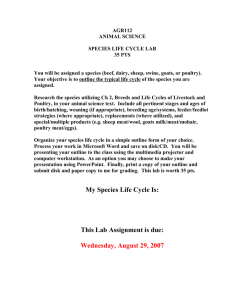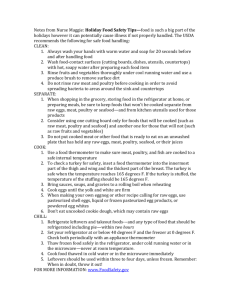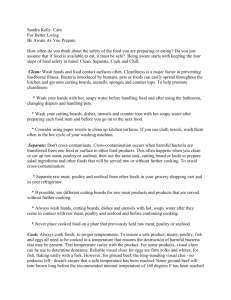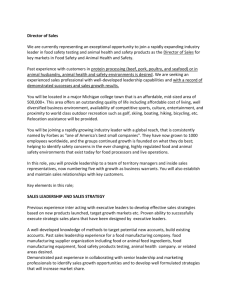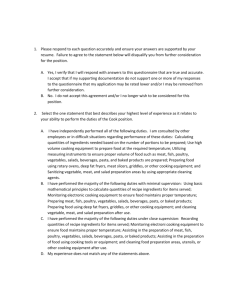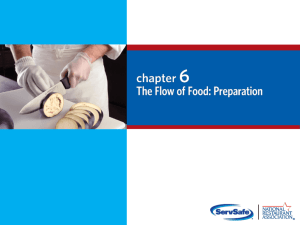ch 6 homework - Lakewood City Schools
advertisement
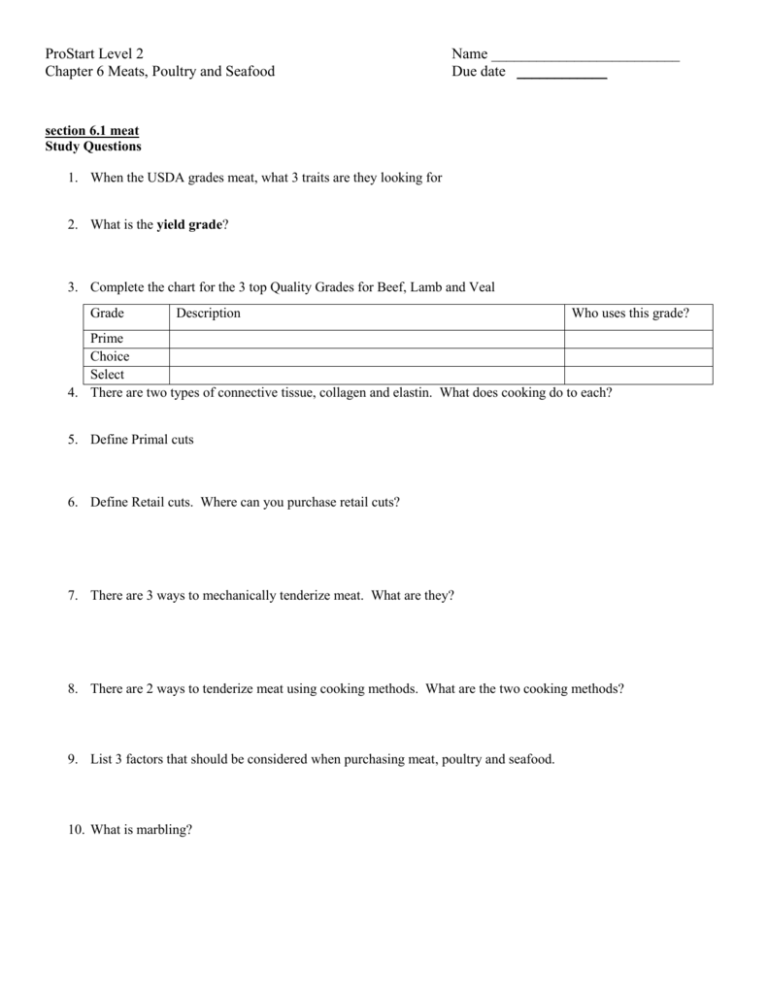
ProStart Level 2 Chapter 6 Meats, Poultry and Seafood Name _________________________ Due date ____________ section 6.1 meat Study Questions 1. When the USDA grades meat, what 3 traits are they looking for 2. What is the yield grade? 3. Complete the chart for the 3 top Quality Grades for Beef, Lamb and Veal Grade Description Who uses this grade? Prime Choice Select 4. There are two types of connective tissue, collagen and elastin. What does cooking do to each? 5. Define Primal cuts 6. Define Retail cuts. Where can you purchase retail cuts? 7. There are 3 ways to mechanically tenderize meat. What are they? 8. There are 2 ways to tenderize meat using cooking methods. What are the two cooking methods? 9. List 3 factors that should be considered when purchasing meat, poultry and seafood. 10. What is marbling? 11. Complete the following chart on meat using the following cooking methods (broiling, grilling, roasting, sautéing, stir-frying, pan-frying, deep-frying, poach, simmer, boil, braising, and stewing Cooking Techniques List the cooking methods Type of meat best suited to method, tender or tough? Dry Heat Dry Heat with fat and oil Moist Heat Combination 12. How do you prepare meat strips for sautéing? (see dry-heat cooking with fat and oil) 13. Why do you allow a roast to rest for 15 to 30 minutes after removing it from the oven? 14. What is carryover cooking? 15. Meat served with drippings released during roasting is called _____ ______. 16. Section 6.2 Poultry Study Questions 17. What are the 3 grades of Poultry? 18. If you were grading poultry, what would you look for? 19. What is the difference between white meat and dark meat? 20. Meat and Poultry should be received at ______ F 21. When would you reject a delivery of poultry? 22. What is another name for a young pigeon? (seeTable 6.4 23. You are checking to see if your chicken is done. a. What should happen to the meat when you press on it? b. What color should the juices look like? 24. Cook poultry to ______ F 25. Poultry should be cooked until the meat is opaque. What does this mean? 26. Describe 3 cooking methods for poultry. 27. What do you do when you truss a turkey or chicken? (see figure 6.35) Section 6.3 Seafood Study Questions 28. What are the 4 grades of seafood, as established by the National Marine Fisheries Service (NMFS)? 29. Complete the chart of seafood categories Seafood categories Fin fish Flatfish Round fish Shellfish Crustaceans Mollusks Cephalopods Description Example Best cooking technique 30. Match the following forms of round fish with the correct definition. Draw a line to the correct match. a. Whole or round Only viscera (guts) removed b. Drawn Two sides cut away from the backbone c. Dressed Cross section cut, generally from large fish d. Fish fillet Boneless pieces cut from the sides e. Butterfly fillet The fish just as it was caught f. Steak Viscera, scales, fins and often the head removed 31. How do you know if fish is fresh when you receive it? 32. Receive fish and shellfish at ______ F or lower. 33. How long do you have to retain shellfish tags after the last item from the delivery has been served? 34. How do you know if a mollusk (clams, oysters, mussels) is alive when you receive them? 35. What is the best way to determine the proper cooking method for seafood? 36. What are 4 poaching liquids that can be used when cooking seafood? 37. How do you make fumet, a poaching liquid for fish? just the basic steps please. 38. Define En Papillote 39. Define the following combination cooking methods for seafood a. Bouillabaisse b. Jambalaya 40. What are the 4 ways you can tell if fish is done? Section 6.4 Charcuterie and Garde Manger Study Questions 41. What is the difference between Charcuterie and Garde Manger? 42. Complete the chart on types of Charcuterie Type of Charcuterie Definition including ingredients Examples Sausage Fresh sausage Smoked/Cooked sausage Dried/Hard sausage Forcemeat Pate Terrine Mousseline 43. ServSafe Connection What are the minimum internal temperatures required for TCS foods? a. Poultry _____ F for 15 seconds b. Ground meat, including beef and seafood _____ F for 15 seconds c. Seafood and steaks/chips of pork, beef, veal, and lamb _____ F for 15 seconds d. Roasts of pork, beef, veal, and lamb _____ F for 15 seconds
